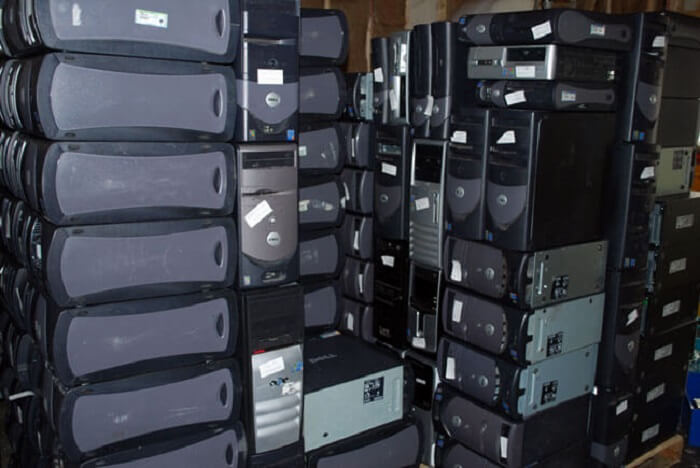A senior lecturer in Analytical and Environmental Chemistry, University of Lagos (Unilag), Dr. Temilola Oluseyi, has said about 400,000 units of second-hand desktop computers are imported into the country every month.
Oluseyi also stated that recycling of Electronic Waste (E-Waste) is very harmful to the human body as well as the environment especially the soil.
Advertisement
Recall that the Minister of Science and Technology, Ogbonnaya Onu, had last month assured that the ministry was making efforts to ensure the safety of the environment and mitigate the impact of electronic wastes in the country.
Onu disclosed this when he received the Executive Secretary of E-Waste Producer Responsibility Organization of Nigeria, Mrs. Ibukun Faluyi, who paid a working visit to the Ministry.
Oluseyi who spoke exclusively with THE WHISTLER on Sunday in Abuja said E-Waste is chemically and physically distinct from other forms of municipal or industrial waste, which she said contain intricate blends of plastics, and chemicals, which when not properly and carefully handled can be dangerous to people and the environment.
She said: “About 400,000 units of second-hand desktop computers (personal computers or cathode ray tubes) are imported into the country every month.
Advertisement
According to her, the composition of e-waste is very diverse and differs in products across different categories with more than 1000 different substances which fall under ‘hazardous’ and ‘non-hazardous’ categories.
Oluseyi said: “Studies have revealed that heavy metals present in the soil not only diminish the productivities and qualities of crops but also threaten the safety of ecosystem and human health.
“Plants can absorb these metals from soil by their roots, transport them upwards to their shoots, and finally accumulate them inside their tissues. Different plant species have large variation in terms of metal accumulation ability. In addition, direct foliar uptake of heavy metals from the atmosphere can also take place during plant growth.
“Oral ingestion of contaminated food has been proved to be an important pathway for the transfer of heavy metals from the environment to human bodies.
“Studies on the accumulation of heavy metals from rice, and organic pollutants from vegetables grown around uncontrolled e-waste recycling sites have shown high levels of lead, cadmium and toxic organic pollutants such as polybrominatedbiphenyls (PBBs),Polybrominateddiphenylethers (PBDEs), and Polychlorinated bipheny PCBs in these local food samples.”
Advertisement
She further added that samples of road side soil and indoor dust were specifically collected from selected e-waste recycling and dismantling locations in Westminister, Lawanson and Alaba in Lagos, and Agbara Morogbo in Ogun State, with a view to assess the health risk associated with it.
“The health risk assessment shows that hazard quotient values of the metals were found greater than 1 in children than in adults. This suggested that children around the e-waste soil, road side soil and indoor dust run a greater risk of metal toxicity and can contact diseases in the polluted environment.
Generally, the e-waste soils were the most contaminated with higher concentration of trace metals compared to the road side soils and indoor dust samples. Lawanson and Alaba e-waste soils had the highest concentration of Copper.
“Agbara Morogbo e-waste soil had the highest concentration of Cadmium, lead and arsenic. The health risk assessment of the heavy metals in Lawanson soil and dust predicted that children are of higher risk of serious health problems than adults in the future, ” she said.
Findings by THE WHISTLER revealed that some African countries had restricted some gadgets from entering their countries. In some instances, Kenya had banned the importation of second hand electronic gadgets into the country from January 2020 to protect it from being used as an e-waste dumpsite.
According to the report, the ban will majorly affect electronic gadgets, old computers and laptops by donors and other multinational companies to schools and other institutions in the country.
Advertisement
Director of Environmental Education in the Ministry of Environment, Ayub Macharia decried that Kenya has been a victim of illegal movement of e-waste from developed countries which is a major global challenge.
“The move to ban import of old electronic gadgets will be contained in the Extended Producer Responsibility Regulations. We are putting strict regulations to deter import of obsolete electronics,” he said.



